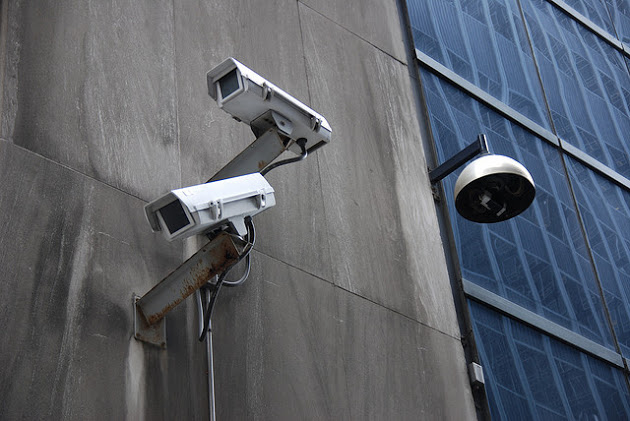It looks like you're using an Ad Blocker.
Please white-list or disable AboveTopSecret.com in your ad-blocking tool.
Thank you.
Some features of ATS will be disabled while you continue to use an ad-blocker.
2
share:

I don't mean to create any doom porn, just thought this info sheds a little insight as to what MAY occur in the year as a kind of summary. Certainly there are other possibilities too.
After Edward Snowden released some of the most significant national security leaks ever, we've been fed a constant stream of sickening revelations. Snowden's message has mostly been listened to, and the year culminated with him even getting a spot on prime time TV to tell us that “a child born today will grow up with no conception of privacy at all.” But it's not just the NSA's unregulated carpet bombing of civil liberties that you need to worry about. While we'll apparently hear more from Snowden in the new year, a new barrage of threats to privacy are also likely to take place. These are the privacy threats of the near future.
A. Law enforcement surveillance
Initially funded in 2012, FirstNet emerged as a “key recommendation of the 9/11 Commission.” It's a project that seeks to create a single broadband network over the entirety of the United States for use by first responders, be they paramedics, fire-fighters or law enforcement. At the moment, there are fewer than a dozen tests of FirstNet taking place in states including California, North Carolina, New Mexico, Colorado, Mississippi and New Jersey, and the project does have some positive applications. One example is that after 'tagging' a disaster victim with a small device, their vital signs can be monitored remotely from a control centre, allowing medical staff to more efficiently prioritise those who most need treatment.
A demonstration of some potential applications using FirstNet.
www.youtube.com...
B. Bionic augmentations
The DIY bio-hacking scene really blossomed in 2013, and the gap between man and machine, skin and silicon became that little bit less distinguished.
the DIY cyborg.
www.youtube.com...
We are already well aware of the kind of back doors and zero-day exploits of commercial products that the NSA makes use of. From iPhones to Microsoft Windows, if something isn't open source and thus open to scrutiny from the wider expert community, no one can be sure of quite how secure it is.
Worryingly, back doors have already been discovered in ageing medical tech. Security researcher Barnaby Jack, for instance, this year developed a method for wirelessly hacking into pacemakers, sending the device into a high voltage overload and its host into a fatal spasm.
With this in mind, and the possibility of having access to data describing or even controlling your bodily functions compromised, the rise of bionic augmentations may be accompanied by the ultimate invasion of privacy, as soon as commercial companies decide to monetize the movement.
C. Increased demand for a private surveillance sector
In the last days of 2013, Jacob Applebaum at the Chaos Computer Club conference described some truly phenomenal pieces of surveillance technology being used by the NSA's elite hacking force: a device used in black bag attacks that can attack a computer when placed within 8 miles of its target, USB cables with hidden chips that allow network access, and—something that is beyond even the most morbid dystopian nightmare—a piece of kit that beams radiation at people and the computers around them, providing “the means to collect signals that otherwise would not be collectable, or would be extremely difficult to collect and process.”
D. The continuing fight for privacy and the rise of Europe
Groups such as Electronic Frontier Foundation and American Civil Liberties Union are enjoying bigger platforms than ever before, helping them spread the message that privacy is something worth preserving.

Viviane Reding, the EU's commissioner for justice, is keen to see member states unite in safeguarding privacy.
While political reform is taking place in Europe, the continent may become the epicentre for the business of privacy too. As Silicon Valley companies are consistently shown to be unreliable or conspirators with US surveillance programmes, users in search of secure communications are looking to European companies. Vikram Kumar, CEO of tech company MEGA, predicted this: “I think there’s a business opportunity for companies to be based in Western Europe, if they want to provide reassurance for their customers around privacy.”
Source
motherboard.vice.com...
If you read the above article, there is more detailed information. Hopefully a lot of this won't become widespread but I think the potential is probably there.
But it's not just the NSA's unregulated carpet bombing of civil liberties that you need to worry about. While we'll apparently hear more from Snowden in the new year, a new barrage of threats to privacy are also likely to take place. These are the privacy threats of the near future.
Many of the applications of FirstNet ran into their own security concerns such as individuals who administer the net, may or not be, classified with security levels. Not that many people can qualify for the higher levels such as are needed in either Military or civilian jobs for the government. I have heard no news about this for sometime as it looks like they have punted or gone back to the drawing board.
Good post as I had forgotten all about Firstnet.
I remember that CCA told shareholders that Firstnet would be incorporated into their prison systems. If you are looking for a greedy company Corrections Corporation of America fits the bill.
As I have said before much of this is generational and I don't see anything to worry about-the loss of civil liberties. They know it all anyway so why worry. A man just entering into the business world at 25 is, without a doubt, more concerned about privacy than men that have left middle age behind.
spooky24
As I have said before much of this is generational and I don't see anything to worry about-the loss of civil liberties. They know it all anyway so why worry. A man just entering into the business world at 25 is, without a doubt, more concerned about privacy than men that have left middle age behind.
Interesting take. I would agree that attitude toward privacy is generational, but would flip it and say the younger people are far less concerned with privacy than older people. I would agree that in principle they should be more concerned, but in actuality (IMO) they aren't.
In my day-to-day life most of my colleagues are in their early-mid 20s (I'm in early 30s) and the things they do on social media I find baffling, e.g. open discussion of illicit drugs & behavior, criticism of administration in an unprofessional manner, etc. No matter if what they are doing is right or wrong, they do stand to lose a great deal.
For most of their lives, they've been in a world where it's acceptable, if not encouraged, to put every aspect of their life on the internet for the entire world to see. For children born in the past few years, they'll have spent their entire lives in it- and know nothing else. I'm not against social media per se, but I find the way people (and governments) use it to be troubling.
You may very well be right that privacy is only an illusion. But, I would argue that we do need to worry about loss of civil liberties. It may all be wishful thinking, but perhaps someday we may be able to chip-away at the surveillance state and gain some of those freedoms back. The odds are slim, but it will only be possible if we remember that privacy is a basic human right.
Does this not remind anyone of Hitler's rise to power, only on a grander scale?
I have thought for years how easy it would be to microchip the population. The current push to vaccinate would be a perfect delivery system.
How do we know that our 'routine' blood work isn't being used for DNA profiling? What are the chances of every new-born baby being tested, profiled and microchipped?
That the 'Bushes'' had a long-standing personal friendship with osama ben laden is well documented.
That the muslim religion calls for total world domination is fact.
That our current 'leader' has strong communistic and muslim philosophies is still speculation, to some.
Public knowledge of what our government is doing, and what their future plans are, doesn't begin to scratch the surface of what is REALLY going on. Our knowledge of technology usually runs 20-40 years behind what is actually known and used by the government.
I have thought for years how easy it would be to microchip the population. The current push to vaccinate would be a perfect delivery system.
How do we know that our 'routine' blood work isn't being used for DNA profiling? What are the chances of every new-born baby being tested, profiled and microchipped?
That the 'Bushes'' had a long-standing personal friendship with osama ben laden is well documented.
That the muslim religion calls for total world domination is fact.
That our current 'leader' has strong communistic and muslim philosophies is still speculation, to some.
Public knowledge of what our government is doing, and what their future plans are, doesn't begin to scratch the surface of what is REALLY going on. Our knowledge of technology usually runs 20-40 years behind what is actually known and used by the government.
edit on
400000088America/Chicago311 by nugget1 because: (no reason given)
new topics
-
Are you ready for the return of Jesus Christ? Have you been cleansed by His blood?
Religion, Faith, And Theology: 25 minutes ago -
Chronological time line of open source information
History: 1 hours ago -
A man of the people
Diseases and Pandemics: 3 hours ago -
Ramblings on DNA, blood, and Spirit.
Philosophy and Metaphysics: 3 hours ago -
4 plans of US elites to defeat Russia
New World Order: 4 hours ago -
Thousands Of Young Ukrainian Men Trying To Flee The Country To Avoid Conscription And The War
Other Current Events: 8 hours ago -
12 jurors selected in Trump criminal trial
US Political Madness: 11 hours ago -
Iran launches Retalliation Strike 4.18.24
World War Three: 11 hours ago -
Israeli Missile Strikes in Iran, Explosions in Syria + Iraq
World War Three: 11 hours ago
top topics
-
George Knapp AMA on DI
Area 51 and other Facilities: 17 hours ago, 26 flags -
Israeli Missile Strikes in Iran, Explosions in Syria + Iraq
World War Three: 11 hours ago, 17 flags -
Thousands Of Young Ukrainian Men Trying To Flee The Country To Avoid Conscription And The War
Other Current Events: 8 hours ago, 6 flags -
Iran launches Retalliation Strike 4.18.24
World War Three: 11 hours ago, 6 flags -
Not Aliens but a Nazi Occult Inspired and then Science Rendered Design.
Aliens and UFOs: 17 hours ago, 5 flags -
12 jurors selected in Trump criminal trial
US Political Madness: 11 hours ago, 4 flags -
4 plans of US elites to defeat Russia
New World Order: 4 hours ago, 2 flags -
A man of the people
Diseases and Pandemics: 3 hours ago, 2 flags -
Chronological time line of open source information
History: 1 hours ago, 2 flags -
Ramblings on DNA, blood, and Spirit.
Philosophy and Metaphysics: 3 hours ago, 1 flags
2
